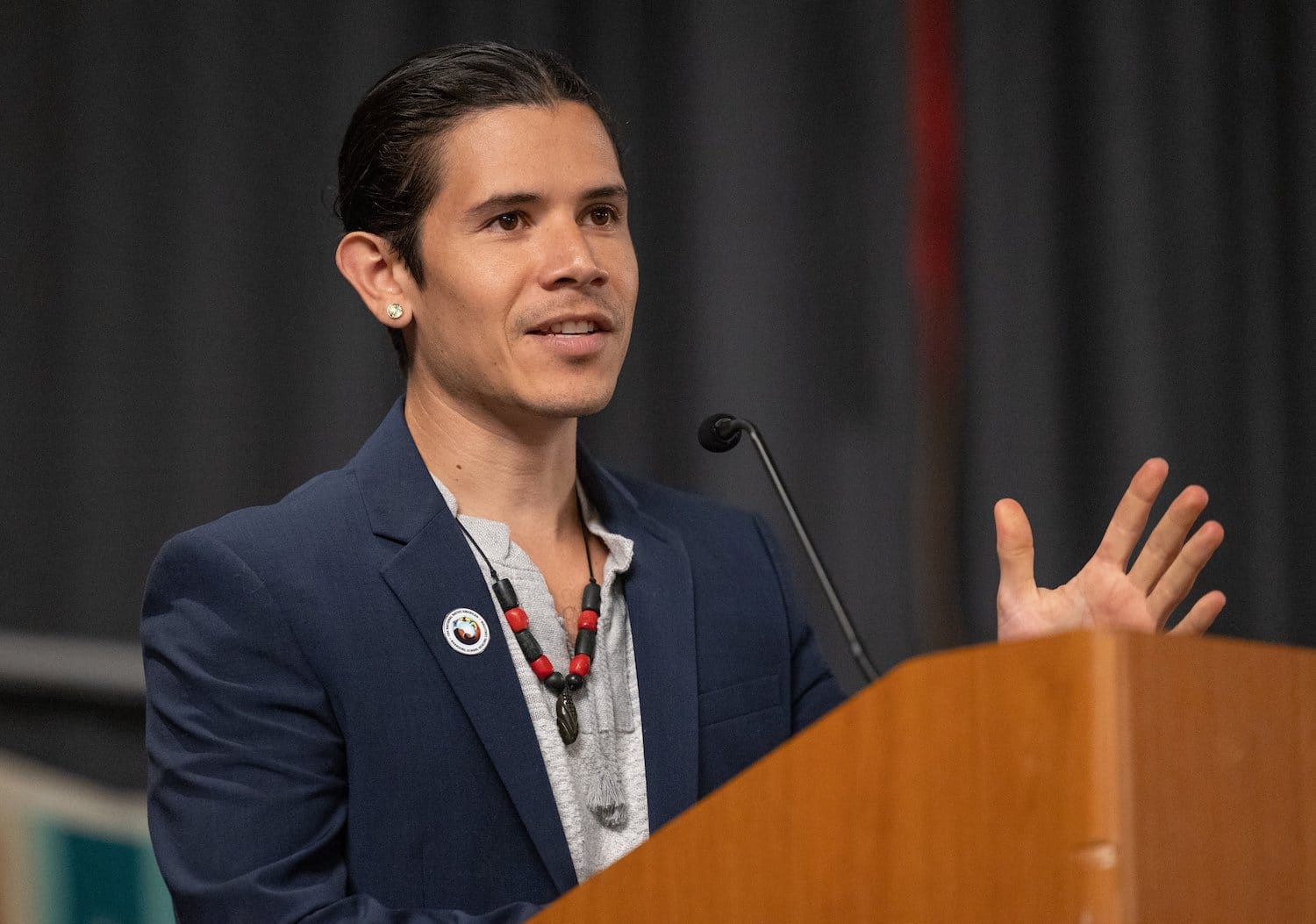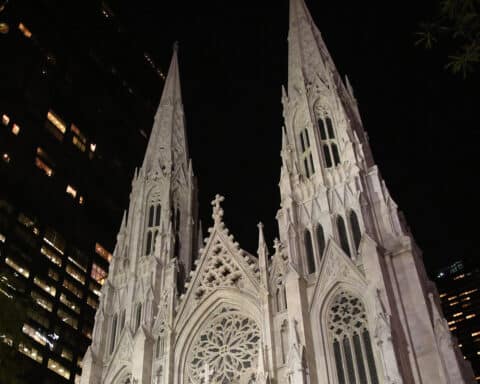BLOOMINGTON, Minn. (OSV News) — Samuel Torres invited those listening to his keynote talk on the history of Native American boarding schools during the second full day of the 84th annual Tekakwitha Conference “to widen the circle.”
Addressing the effects of Native boarding schools — which includes a legacy of forced assimilation and abuse — “is going to take all of us,” a collective effort from people of every race, faith and nation, said Torres, deputy chief executive officer of the Minneapolis-based nonprofit National Native American Boarding School Healing Coalition (NABS). “This is not simply a Native issue, it’s a human issue.”
Torres — who grew up in a Catholic household and is Mexica Nahua on his father’s side and Irish Scottish on his mother’s side — acknowledged that the Native boarding school legacy has “deep roots on these lands” and that “harm is not confined to the past.” Wounds are present and they’re deep, Torres said, and he encouraged a framework of restorative justice to heal the wounds and combat a “culture of forgetting.”
Confronting trauma
During his talk at a hotel in Bloomington, where the July 19-23 conference was being held, Torres suggested a healing framework presented by Maria Yellow Horse Brave Heart: First, confront the trauma. Second, understand the trauma. Third, release the trauma. Fourth, transcend the trauma.
Torres said efforts along this pathway of healing have “just started.”
He said requests from Natives have included: The collection of, and access to, dispersed Native boarding school records; burial site examination using Indigenous techniques and funding to support those efforts; support for Native boarding school survivors to offer their testimony; resources so survivors can direct their own healing; education on Native boarding schools and their impact to be included in school curricula; accountability as Native boarding school information comes to light; and the restoration of land, culture and lifeways.
Gathering for healing
Jody Roy is Ojibwe and originally from Canada, from Atikameksheng Anishnawbek First Nation. She currently lives in Chicago and is the director of the St. Kateri Center in that city.
Reflecting on the keynote talk, Roy, 45, said, “The truth has to be told in order for anything to happen. We can’t heal if our stories and truth are not heard. What is there to reconcile and heal about if we’re not aware of it?”
Roy said she comes “from a line of residential school survivors … my uncle was a deacon, and he was a residential school survivor.” She said she wants to be an ally to others with similar experiences and “try to bring that healing for our people also.”
This year’s conference drew close to 500 attendees, according to Charlene Patton, interim executive director of the Tekakwitha Conference and president of the conference’s board of directors. The annual conference presents opportunities for those gathered to celebrate “local Native culture” as well as the “unique subsection” of Native Catholic culture, said conference co-chair Michele Beeksma, a member of the Grand Portage Band of Lake Superior Chippewa and a member of St. Lawrence Parish in Duluth, Minnesota.
The theme of this year’s conference was Gathering for Healing Through Living Waters, and as Beeksma and co-chair Shawn Phillips — director and pastoral minister of Gichitwaa Kateri in Minneapolis and the Archdiocese of St. Paul and Minneapolis’ Office of Indian Ministry — indicated, healing from the personal and intergenerational trauma experienced at, and as a result of, boarding schools was central to the conference.
DOI report
Torres has been working with NABS since 2019. Founded in 2012, NABS consists of more than 780 Native and non-Native members and organizations “committed to boarding school healing” through national strategies to increase public awareness of the United States Boarding School Policy of 1869 and its aftermath.
A U.S. Department of the Interior report released last year indicated Native boarding schools — many of them operated by various Catholic religious orders — sought to forcibly assimilate Native children to adopt western practices and a Christian way of life, separating children from their families and suppressing Native language and culture.
The U.S. adopted a Native boarding school policy through measures such as the Indian Civilization Act Fund of 1819 and the Peace Policy of 1869, according to NABS.
Such policies sought “Indian territorial dispossession and Indian assimilation, including through education,” the DOI report stated. Torres, during his talk, said it was a process of “utilizing education as a weapon.”
The DOI reports roughly 50% of the more than 400 Native boarding schools the U.S. government operated between 1819 and 1969 “may have received support or involvement from a religious institution or organization, including funding, infrastructure and personnel.” Funding also may have come from “Tribal trust accounts, including those based on cessions of Indian territories to the United States,” the DOI report states.
Per DOI research, assimilation practices at Native boarding schools included renaming children with English names; cutting children’s hair; discouraging the use of Native languages, religions and cultural practices; and organizing children into groups to perform military drills. Manual labor was part of boarding school curricula and rules were often enforced through punishment, the DOI report states. The report indicated that “based on the Federal Indian Boarding School Initiative investigation’s initial analysis, approximately 19 Federal Indian boarding schools accounted for over 500 American Indian, Alaska Native and Native Hawaiian child deaths.”
New online tool
NABS has been continuing work on an online tool — called the National Indian Boarding School Digital Archive — to help Native Americans search for information on relatives who attended Native boarding schools. According to NABS, the NIBSDA project seeks to make records more accessible to survivors and their descendants.
An online list of roughly 87 Catholic-run Native boarding schools in the United States — including such schools in Minnesota — was made available in May by a group of archivists, historians, Catholics and tribal members.
The list — which is searchable by state, school and key terms — includes eight Minnesota schools that were affiliated with the Catholic Church. They were among 21 total Native boarding schools in Minnesota, according to the DOI.
The majority of those affected in Minnesota were from the Dakota and Ojibwe tribal nations, according to the list.
Putting pressure on leadership
Allison Spies, archives program manager for the Archdiocese of St. Paul and Minneapolis‘ Office of Archives and Records Management since 2019, said she began encountering records of the Native experience when she was a genealogy research volunteer for the archdiocese. Through professional networks, Spies worked with other archivists, historians, Catholics and tribal members to consider how to grant more streamlined public access to record information.
Spies held a workshop during the Tekakwitha Conference titled Catholic Archives and Boarding Schools Research, which provided an overview of the list published in May. In addition to explaining events leading up to the list’s creation, Spies talked about how the database can be used to locate records. She also provided information about Catholic archives and their placement in efforts to address the Native boarding school legacy.
She considered her workshop to be a complement to the talk Torres gave and told The Catholic Spirit that Catholic archives are a key component in taking steps toward truth and healing through greater transparency and access.
Torres told The Catholic Spirit after his talk that current local efforts — including the collection of Native boarding school records as well as avenues through which boarding school survivors’ experiences can be heard and shared — must continue.
“It’s policy, it’s education, it’s dialogue with our neighbors,” Torres said about what’s needed to address the Native boarding school legacy. “We collectively can continue to put pressure on leadership if we talk about this … if we continue to be persistent in how we organize our language around what we want to see.”
Rebecca Omastiak is news editor for The Catholic Spirit, newspaper of the Archdiocese of St. Paul and Minneapolis.





